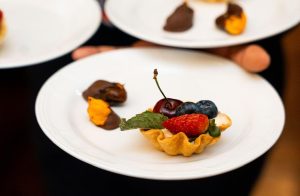

ITALY is synonymous with style, and its legendary cuisine dates back to antiquity. Ancient Romans reclining on couches arranged around low tables, might enjoy a meal with a starter of tuna, anchovies and olives, a main course of roasted goat chops, and a dessert of honey, dates, nuts and figs. Across the English Channel, their Anglo-Saxon neighbours would be satisfying their hunger pangs with a bowlful of pottage, supped with a spoon from a wooden bowl.
For Italians, food represents happiness and bringing people together, and continues to be a serious business in the 21st C. In particular, for many Italians, the day revolves around when, where and what you will eat; the meal is the purpose of the day. With many iconic dishes, it’s little wonder that Italian cuisine is often ranked the best in the world.
Eight years ago, Italy’s Ministry of Foreign Affairs launched the first ‘Week of Italian Cuisine in the World’. This annual event promotes delicious Italian cooking, the Mediterranean diet, Italian agri-food products and wine, and is celebrated from Zimbabwe to Los .

Italian chefs instruct students on mushroom preparation.
Angeles to China, in 130 countries across the world. In this week, Italian chefs would travel all over the world, their suitcases bulging with cheeses and wines, preparing to share their culinary skills through tastings and master classes.
This year the theme of the celebration was ‘The Mediterranean Diet and Culinary Roots – Health and Tradition’. It’s hardly surprising that the Mediterranean diet, which focuses on fruit, vegetables, nuts, legumes, fish and olive oil, has become so popular. Who doesn’t long to have a clear skin, glossy hair, boundless energy and good health? Reducing meat consumption and eating more plant-based food is said to prevent many chronic diseases and to promote longevity.

Fruit tartlet dessert at gala dinner celebrating Week of Italian Cuisine in the World 2024
As part of the culinary week this year, demonstrations, workshops and a concluding gala dinner were held at the Peech Boutique Hotel, an elegant resort in Rumbavu Park, off ED Mnangagwa Road. Italian chefs, sommeliers, and mixologists having imparted their skills to students from Mike Farrell’s Hospitality School in Harare, served cocktails to invited guests. It was twilight, and peacocks were calling from the lake, when Farai Chimba, eminent member of the Tourism Business Council and Master of Ceremonies, welcomed everyone to the feast. Candle-lit tables were set with gleaming silver flatware, sparkling wine glasses and linen table napkins, while lush floral centrepieces arranged around the Italian flag added to the wow-factor.
The global celebration of Italy’s culinary tradition continued, as HE Umberto Malnati spoke of the taste, healthy lifestyle and cultural diversity of Italian cuisine, a combination which could make Italy the food capital of the world.
Guest of honour, Amai Auxillia Mnangagwa, who has received world acclaim for promoting traditional food in Zimbabwe, described the ways in which foods passed on through generations affect a people’s identity and culture. She encourages farmers to grow small grains such as zviyo, mapfunde and gorosi, crops that can tolerate high temperatures and erratic rainfall. Their consumption also boosts the immune system and beats chronic illnesses. The cookout competitions the First Lady organises across the country have raised awareness of the benefits of traditional food, and promoted the concept of gastronomy tourism in Zimbabwe.
As the speeches ended, smartly dressed students served the antipasto, also known as the starter. Shavings of black truffle garnished a rich, tangy parmesan fondue, enveloping a soft-boiled egg. The floral and citrus notes of Le Lore Garganega, a sparkling wine, paired well with the umami flavour of the fondue.
The subtle herbal nuances of Le Lore Bianco, a still white wine, complemented the smooth-tasting fresh pasta with mushrooms. This was a standout dish; clearly the masterclass on pasta making had been success.
A luscious, palate cleansing peach sorbet was followed by a fusion dish of sliced fillet with sadza nemuriwo. Vanilla panna cotta topped with mango and crunchy cashew nuts, was fresh tasting and delicious, but the piece de resistance was the friandise, a flaky and tender shortcrust pastry tartlet, filled with creme patissiere, fresh cherries and fresh strawberries. Served with Limoncello, a lemon liqueur, this was the perfect after-dinner digestif.
Each course was paired with a wine recommended by Giovanni Tiso, an oenologist (one who studies the science of wine making) and a sommelier (an expert in tasting wine). Under Giovanni’s tutelage, the students from the Hospitality School were initiated into the pairing of wine with food.
The evening drew to an end, with closing remarks and a vote of thanks from the Ministry of Sports, Recreation and Culture. After an incredible food and wine experience we had made new friends, celebrated the culinary traditions of both Zimbabwe and Italy, and enjoyed warm Italian hospitality at its best.
A Matter of Taste with Charlote Malakoff